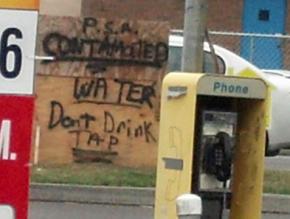Toledo is a warning sign
Lifelong Toledo resident explains what led to the ban on drinking water last weekend--and what it will take to stop such disasters from happening again.
Water, water, everywhere,
Nor any drop to drink.
--"Rime of the Ancient Mariner"
HOW DOES the fourth-largest city in Ohio, which sits on the 11th largest freshwater lake in the world, go 50-plus hours with no access to tap water?
The simple answer is that the water intake for Toledo's water supply was surrounded by a harmful algal bloom. Around 2 a.m. on August 2, Toledoans, and residents of other northwest Ohio and southeast Michigan cities were told that our water was toxic, and to not even touch it.
I awoke to several voice mails and texts from my parents and friends to avoid the water, and make sure I didn't give any to my cat. As one does in 2014, I went to the Internet and found out that Toledo was making headlines--from our local paper, the Toledo Blade, to Al Jazeera.
Like many of the "natural" disasters of the last several years, there is nothing natural about this. Harmful algal blooms are not a result of some natural cycle of these bacteria. These are a result of excess farm and industrial runoff, under treated sewage from lake communities, and the depletion of the flora and fauna that would normally consume or otherwise keep these blooms in check. This is a warning sign.

There are millions of people who rely directly on the lakes for their water and livelihoods. Fortunately, there were no major problems in Toledo or surrounding communities caused by this. There have been no major illnesses or deaths reported from consuming contaminated water, or from lack of access to water. In fact, water was rather quickly diverted to Toledo.
Several distribution centers were set up by the National Guard around Toledo, and people were generally looking out for their family, friends and neighbors. My Facebook feed was full of people offering to give rides to or collect water for people if needed. And to judge from reports in other media, Facebook wasn't an anomaly.
This shouldn't be surprising as we generally see people band together in the face of crises. In the Hurricane Katrina and Hurricane Sandy disasters, for example, the real problems were generally caused by decades of neglect, plus lack of preparation by city, state and federal agencies, and their inept response. Some reports indicate that the city of Toledo had been warned about the bloom, but action was not taken.
Any criticisms of the response of the Toledo , even if valid, miss the point. This never should be a situation that requires a response--it should never take place in the first place.
While serious, the scale of what happened in Toledo can't even begin to approach the devastation of wildfires, hurricanes, earthquakes or other natural (and not-so-natural) disasters that we've seen in the last decade especially. However, the possibility is there. By 10 a.m. Monday, Toledo's water supply was deemed safe. What if it took longer? What if half the state had been affected, as happened in West Virginia?
What we are seeing are the results of what environmentalists have been warning about for decades--unplanned city growth, irresponsible use of water by industry, overuse of fertilizers in agriculture, and the ever-present drive for profit are destroying the planet's resources. From the Israelis' use of access to water as a weapon against Gazans, to the water shutoffs in Detroit, and now this, it should be be clear that the solution will not be a new round of watered-down, loophole-filled regulations.
So long as resources like the Great Lakes are viewed as commodities from which to profit, and not as a source of a life-sustaining resource, we will face much worse as we move forward.
In the end, what we need is a revolutionary change. We need a system that puts people and the environment first--one in which all of us have a say in how resources are used and how we're affected by that use. In short, we need socialism, or we will get barbarism.


